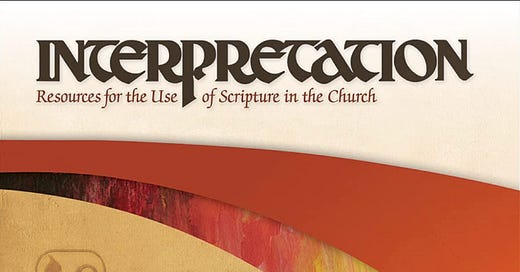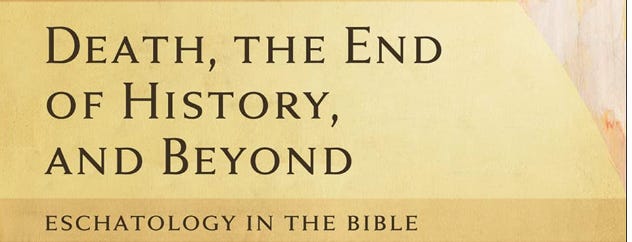Jesus and the Future
Many of us gather together bits and bobs from various parts of Scripture, work on the texts and work them out, and then synthesize them into the “biblical” view of, say, the intermediate state. What we don’t admit, and often it is invisible to many of us, is that our synthesis morphs into something no one in the Bible actually believed. This is perhaps more true about eschatology than any major theological topic. Please sit with the words in italics.
Greg Carey, in Death, the End of History, and Beyond: Eschatology in the Bible, does not do that synthesis bit into a so-called biblical theology, which is sometimes in fact unbiblical. Carey likes the tensions and nuances and diversities of various views of the Bible’s texts. He recognizes not a simple synthesis but more of some common themes with lots of differences.
What about Jesus then?
First, one has to connect Jesus’ view of the kingdom, and he lands on the inaugurated eschatology side (both present and future), to Jesus’ identity and thus to Messiah itself. This is a bold, and historically solid, connection. It’s hard to be obsessed with kingdom and not have a king in mind. Greg has a nice condensed conversation about the time of the kingdom: present, future, both. But for Carey this is much of a nuanced complication of kingdom themes.
Second, Jesus’ view of the kingdom is very this-worldly as it pertains to a reconstituted Israel at times (Matt 19:28); John’s “eternal life” theme complicates the picture but complements it as well; and the kingdom theme can go too easily into imperialism but the kingdom of Jesus subverts the imperial themes too often.
Third, I love this simple line: “Kingdoms imply kings.” Yes they do. A kingdom, as I have taught for years, is a people governed in a territory by a king. Carey recognizes various titles used for Jesus, including Son of Man and Son of God and Son of David, but then delves into the nuances of Mark, Matthew, Luke, and John as they offer various portraits of Jesus. Both alike and not alike. Overall Jesus is the one who proclaims the kingdom of God, which will meet its goal in the future as a banquet, an angelic afterlife, and a rule over the twelve tribes.
Fourth, Carey sketches Son of Man – no small discussion for anyone today – and how this term in the Gospels is used by Jesus for himself. Jesus’ own self-perception transcends ordinary self-perceptions – he thinks highly of himself, in other words – but the Gospels paint a picture who thought that way. Thinking of himself, then, of Son of Man is not off the map. It fits the Jesus of the Gospels.
Fifth, he turns to the general resurrection. Jesus predicts his own resurrection a few times. He does not have much to say about the general resurrection, though he gets into it with the Sadducees. Mark 12:24-27:
Mark 12:24 Jesus said to them, “Is not this the reason you are wrong, that you know neither the scriptures nor the power of God? 25 For when people rise from the dead, they neither marry nor are given in marriage but are like angels in heaven. 26 And as for the dead being raised, have you not read in the book of Moses, in the story about the bush, how God said to him, ‘I am the God of Abraham, the God of Isaac, and the God of Jacob’? 27 He is God not of the dead but of the living; you are quite wrong.”
Here we see Jesus thinking of the patriarchs existing in a risen state of some sort, and compares the risen state to an angelic state of being. Some passages suggest that upon death one enters into the presence of God (Luke 23:42-43). Then there is the parable of rich man and Lazarus in Luke 16:19-31, which teases us into wondering what Jesus believed about the intermediate state or afterlife. John’s Gospel has eternal life in the here and now, as well as in the future. John’s Gospel has a future resurrection, too (11:24).
OK, sixth, many want to know what anyone believes about Jesus’ resurrection and Carey says “I write as a resurrection believer.” That is, that very soon after his death some disciples encountered Jesus alive. And, the Gospels narratives are given their own nuances – and that it is hard to put the resurrection narratives into a tight bundle of order. That’s so true. Those narratives also include commissionings, dynamics of authority among the disciples, and they emphasize the corporeality of the body of Jesus after his resurrection.
Finally, believers are called to live out the implications of the resurrection, a Gospel-kind of new creation theology, all empowered by the Holy Spirit. Jesus’ resurrection, however, poses a problem: it was individual and not general. Which fits with a few other coming-back-to-life-stories in the New Testament (like Jairus’s daughter in Mark 5:21-24, 35-43). The Gospels do not however seem to care about the implication of a one-man resurrection vs. the general resurrection.
Complications abound. That’s OK.






“Complications abound.” - I feel like the older I get the more that’s true of everything about the Bible! But it actually increases my faith, because my life is complicated too and resists easy answers.
Excellent!!! Plenty to think about!
Some of my guiding questions(those meaningful questions that never leave our thoughts) activated by this post:
Is “eternal life simply a longevity thing?
I believe that we have more witnesses of “eternal life” than we realize. In my mind, someone discovers eternal life anytime they experience, and flourish in, a life that is not bound by “The Rut” that many talk about and by which are captured and held prisoner! Discovering “The Gospel” in an “Embracing Grace” sort of fashion - And II wouldn’t rule out being “born again - breaks through the wall of the rut, and allows us to “try it, we’ll like it!!!” A sizable crack in the wall just may be events like the recent “Asbury revival”!
“Inaugurated eschatology” may speak to some of this, as something that lives across time?
If our main concern is the future, how much of the present do we miss, and, thus, how many people miss the tov we carry?
Thank you for great “Brain-Yeast”!